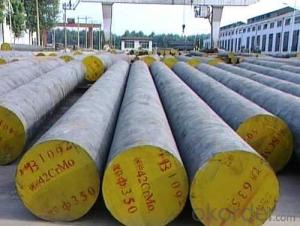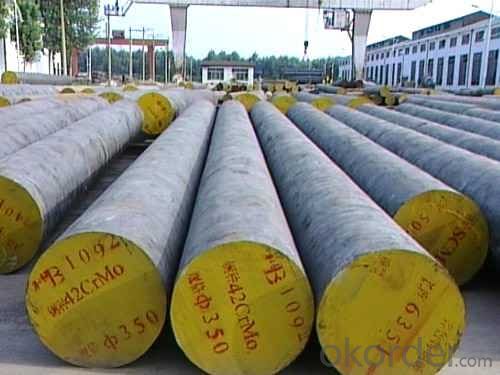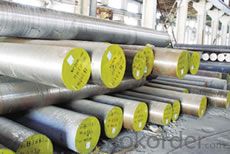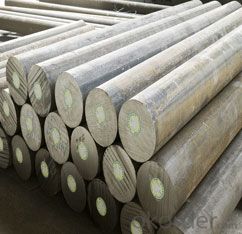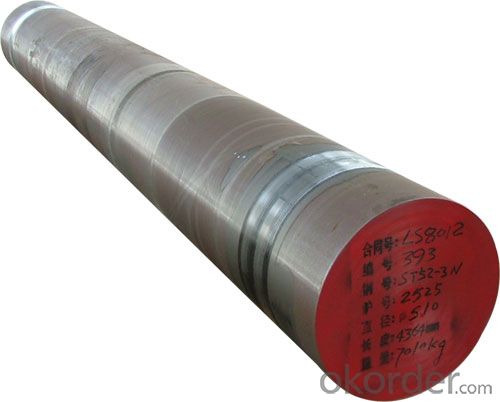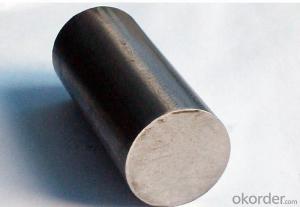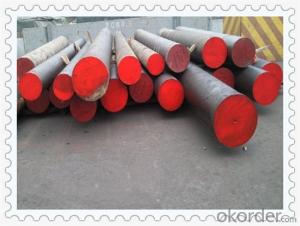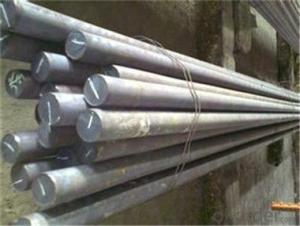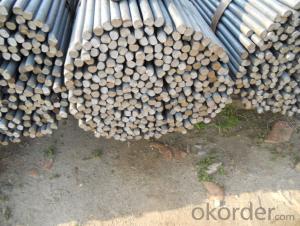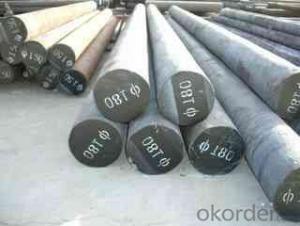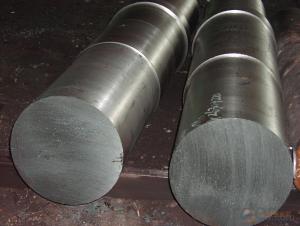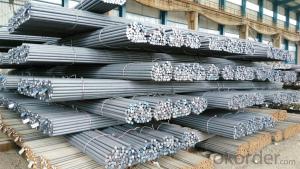alloy round steel bar 60*60 12M JIS STANDAR
- Loading Port:
- Tianjin
- Payment Terms:
- TT OR LC
- Min Order Qty:
- 100 m.t.
- Supply Capability:
- 100000 m.t./month
OKorder Service Pledge
OKorder Financial Service
You Might Also Like
Product Description:
Specifications of Common Steel Round Bar
1. Grade: 304, 316L, 321
2. Type: Mild carbon steel
3. Shape: Round bar, solid bar of steel with circular section
4. Diameter: 8mm-150mm
5. HS Code: 72283010
Usage and Applications of Common Steel Round Bar
1. Common Steel Round Bar of 8-25mm, or small round is mostly used for straight bundles supply, and used for steel, bolts and various mechanical parts. While the bigger round bar, or more than 25mm hot rolled bar, is mainly for the manufacture of mechanical parts or for seamless steel billet.
2. Steel round bar is used in construction and a large number of architectural and engineering structures.
3. Besides, we can supply some especial material steel round bar that can be used for main shaft of steamer, hummer shank, with big section and supper force.
Packaging & Delivery of Common Steel Round Bar
Packaging Detail: All goods are packed in bundle with steel strips and shipped by break bulk vessel or container (depend on target market and different ports)
Delivery Detail: 45 days
Trade terms: FOB, CFR, CIF
MOQ: 25 tons per specification; we can negotiate the quantity if the specification is normal or we have stock of one specification.
Weight: The price invoicing on theoretical weight basis or actual weight basis depends on customer’s request.
Shipment: The shipment of bulk break or container is depends on customer’s request and the situation of the port of destination.
Documents given: Full set of original clean on board bill of lading; Original signed commercial invoice; Original packing list; Policy of insurance; Certificate of origin and what the target market needs.
Production Flow of Common Steel Round Bar
We use advanced equipments like Electric Arc Furnace, Ladle Furnace and Vacuum Degasser to produce our products.
Material prepare (billet) — heat up — rough rolling — precision rolling — cooling — packing — storage and transportation
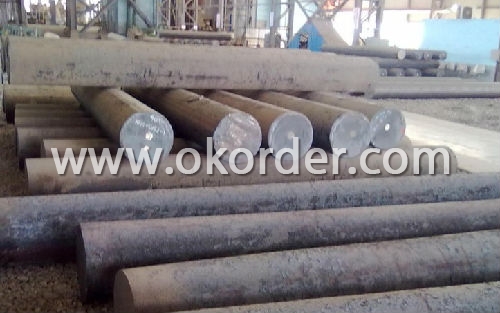
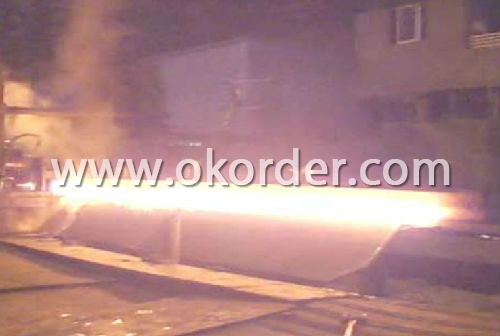
Characteristics of Common Steel Round Bar
1. The steel in which the main interstitial alloying constituent is carbon in the range of 0.12–2.0%.
2. As the carbon percentage content rises, steel has the ability to become harder and stronger through heat treating; however it becomes less ductile.
3. Quality should be in conformity with the specification of the manufacturer. Quantity and packing conditions should be in conformity with the term in the contract.
4. Regardless of the heat treatment, higher carbon content reduces weld ability. In carbon steels, the higher carbon content lowers the melting point.
- Q: What are the factors to consider when selecting a steel round bar?
- There are several factors to take into account when choosing a steel round bar. Firstly, it is crucial to evaluate the grade of steel. Each grade has different properties and strengths, so it is important to consider the specific application and requirements. For instance, if high corrosion resistance is needed, stainless steel grades such as 304 or 316 may be appropriate, while carbon steel grades like A36 or 1018 may be more suitable for structural purposes. Secondly, the dimensions and size of the round bar should be considered. This includes the diameter, length, and tolerance requirements. The size should be chosen based on the specific application, load-bearing capacity, and available installation space. Thirdly, the condition and surface finish of the round bar should be assessed. This includes factors like surface roughness, straightness, and any surface defects. The surface finish should be selected based on the desired aesthetics, functional requirements, and manufacturing process. Another important aspect is the availability and cost of the steel round bar. It is crucial to consider the availability of the desired grade and size from suppliers, as well as the associated cost. Comparing prices from different suppliers is advisable to ensure the best value for money. Furthermore, it is necessary to evaluate the required mechanical properties of the steel round bar. This includes factors like tensile strength, yield strength, hardness, and ductility. The mechanical properties should align with the intended application and load-bearing requirements. Lastly, any additional requirements or certifications should be considered. This could include compliance with specific industry standards (e.g., ASTM, ISO), certifications (e.g., RoHS, REACH), or specific testing requirements (e.g., ultrasonic testing, impact testing). In conclusion, selecting a steel round bar involves considering the grade, dimensions, surface finish, availability, cost, mechanical properties, and any additional requirements. Taking these factors into account will ensure that the chosen steel round bar is suitable for the intended application and meets all necessary specifications.
- Q: What are the different types of surface defects that can occur in steel round bars?
- There are several types of surface defects that can occur in steel round bars, including scratches, pits, roll marks, scale, and cracks.
- Q: What is the maximum elongation of steel round bars?
- The maximum elongation of steel round bars can vary depending on the specific grade and composition of the steel. However, in general, the maximum elongation for steel round bars is typically around 20-30% of its original length. This means that the steel round bar can stretch or elongate by up to 20-30% before reaching its breaking point or ultimate tensile strength. It is important to note that this maximum elongation is influenced by various factors such as the quality of the steel, the manufacturing process, and any heat treatment applied to the bars. Therefore, it is advisable to consult the specific manufacturer's specifications and consider the intended application of the steel round bars to determine the maximum elongation for a particular case.
- Q: Are steel round bars prone to fatigue failure?
- Yes, steel round bars are prone to fatigue failure. Fatigue failure is the result of repeated cyclic loading or stress on a material, causing it to weaken and eventually fail, even when the applied stress is below its ultimate strength. Steel round bars, like any other structural material, are susceptible to fatigue failure due to their inherent characteristics. Fatigue failure in steel round bars can occur due to various factors, including improper design, inadequate material selection, manufacturing defects, or excessive cyclic loading. Factors such as surface defects, notches, stress concentrations, and corrosive environments can further accelerate the fatigue process. To mitigate the risk of fatigue failure, engineers and designers employ various strategies such as implementing appropriate design practices, selecting high-quality materials, conducting thorough inspections, applying stress-relieving treatments, and considering the impact of cyclic loading during the structural design phase. It is important to note that while steel round bars are prone to fatigue failure, the actual susceptibility depends on numerous factors, including the specific steel grade, loading conditions, environmental factors, and overall structural design. Therefore, it is crucial to carefully assess these factors and employ appropriate mitigation measures to ensure the safe and reliable performance of steel round bars in various applications.
- Q: Are steel round bars suitable for use in food processing equipment?
- Yes, steel round bars are suitable for use in food processing equipment. Steel is a durable and hygienic material that can withstand the rigorous demands of food processing environments. It is resistant to corrosion, easy to clean, and can maintain its structural integrity even under high temperatures and heavy usage.
- Q: What is the average cost of steel round bars?
- The cost of steel round bars can change depending on several factors, including size, grade, and market conditions. Normally, steel round bars are priced between $0.50 and $5 per pound. Nevertheless, it is worth mentioning that these prices are only estimates and can vary depending on the specific needs and location of the purchase. Moreover, it is essential to consider additional expenses like transportation, processing, and applicable taxes to determine the total cost. To obtain the most accurate and current information on the average cost of steel round bars in your region, it is advisable to consult local suppliers or conduct market research.
- Q: Can steel round bars be welded to other materials?
- Yes, steel round bars can be welded to other materials. The process typically involves using compatible welding techniques and materials, such as specific filler metals, to achieve a strong and durable bond between the steel round bar and the other material.
- Q: Are steel round bars suitable for aerospace applications?
- Yes, steel round bars are suitable for aerospace applications as they offer high strength, durability, and excellent resistance to corrosion, making them ideal for various aerospace components such as landing gear, engine parts, and structural elements.
- Q: What are the different types of steel round bar coatings used in the automotive industry?
- In the automotive industry, various coatings are commonly applied to steel round bars to enhance their durability, corrosion resistance, and overall performance. Here are some examples: 1. Galvanized Coating: Widely utilized in automotive applications, this coating involves the application of a zinc layer to the steel bar's surface. Galvanized coating provides excellent protection against corrosion, safeguarding the steel from rust and other forms of degradation. 2. Epoxy Coating: This coating is preferred when high chemical resistance is required in automotive applications. It forms a protective barrier against chemicals, moisture, and other corrosive substances. Additionally, epoxy coatings exhibit exceptional adhesion properties, ensuring long-lasting performance. 3. Powder Coating: Known for durability and aesthetic appeal, powder coating is a popular choice for steel round bars in the automotive industry. It involves the application of dry powder to the steel bar's surface, which is then heated, creating a tough and protective layer. Powder coatings offer a wide range of colors and finishes, allowing for customization and branding opportunities. 4. Ceramic Coating: Ideal for automotive applications involving high temperatures, ceramic coatings provide exceptional heat resistance. They form a protective barrier that prevents heat damage and extends the lifespan of steel round bars. 5. Phosphate Coating: Often used as a pre-treatment before applying other coatings, phosphate coatings enhance adhesion and provide additional corrosion resistance. They also improve the lubricity of the steel bar, reducing friction and wear. These examples demonstrate the variety of steel round bar coatings used in the automotive industry. Each coating offers unique benefits and is selected based on specific application requirements. Ultimately, these coatings play a vital role in improving the performance and longevity of steel round bars in automotive applications.
- Q: Can steel round bars be plated?
- Indeed, it is possible to plate steel round bars. Plating, a widely employed technique, serves to augment the aesthetics and safeguard the surface of the bars. The choice of plating material, be it chrome, nickel, or zinc, hinges upon the desired outcome and intended usage of the steel bars. Through plating, one can achieve heightened resistance to corrosion, improved hardness or wear resistance, as well as an appealing final touch. It is imperative to underscore the significance of adequately preparing and cleansing the steel surface prior to plating, as this guarantees a robust and top-notch plated finish.
Send your message to us
alloy round steel bar 60*60 12M JIS STANDAR
- Loading Port:
- Tianjin
- Payment Terms:
- TT OR LC
- Min Order Qty:
- 100 m.t.
- Supply Capability:
- 100000 m.t./month
OKorder Service Pledge
OKorder Financial Service
Similar products
Hot products
Hot Searches
Related keywords
